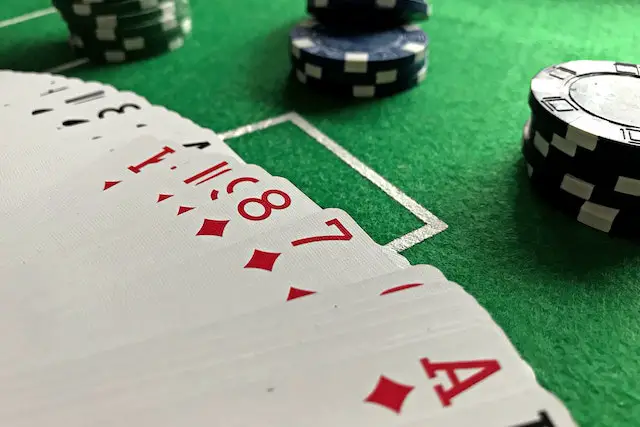Is Poker Illegal?
They aren’t illegal. The longer answer is that gambling with card games is typically illegal, based on the location where it’s being played, by whom, and the amount of money involved. It’s just the gambling part of poker that is legal. However, we all know who would want to play poker if it weren’t for cash.
Understanding Poker: A Brief Overview

Poker is a well-known sport of cards that’s gained international recognition and is now an integral part of informal settings and professional tournaments. With its strategic components, psychological warfare, and elements of luck, poker provides a thrilling and exciting game for those who play. We’ll provide an overview of the game, including its roots, the fundamental gameplay, hand rankings, popular variations, and the playing field of professional poker.
Origins of Poker
The precise origins of poker are not clear since the game has changed through time and its origins are interspersed with different games of cards from various cultures. But its roots can be traced back to the late 19th century in the United States. It is believed that poker took inspiration from a variety of European card games and then developed into the form it is today through influences from American gambling practices.
When poker became popular across the United States and later the world, various variations and regional variations were developed with their own specific rules and subtleties. Poker is a worldwide phenomenon, played in casinos, at home, and on online platforms.
Basic Gameplay
Poker is played using the standard 52 cards. It is played with several players. The game’s goal is to win the pot, the number of bets players place during an entire hand. The pot will be awarded to the player with the most powerful hand or to the last player to remain after all the others have folded.
The game proceeds through betting rounds, where players can bet, raise, call, or fold. Betting rounds can be interspersed by distributing community cards (shared cards) or private cards (hole cards) per the type of game played. Combining strategy, skill, and chance makes poker a fascinating and stimulating intellectual game.
Hand Rankings
The hand ranking in poker can define the power of a hand. The aim is to build the highest-ranking hand based on predetermined hand rankings. The hand rankings in the standard order from the highest to the lowest are as below:
- Royal Flush: A K, Q J 10, Ten of the suit.
- Straight Flush: Five consecutive cards in the identical suit.
- The Four-of-a-Kind: Four cards of the same value.
- A Full house: 3 of one kind and two.
- Flush: Five cards in the same suit, but not in order of succession.
- Straight: Five consecutive cards of any suit.
- Three of a Kind: Three cards of the same type.
- Two-Pair: Two sets of cards of the same value.
- One Pair: Two cards of the same value.
- High-Card: The card with the highest rank on the table.
Knowing hand rankings is essential to making smart choices during games, for example, knowing the strength of one’s hand and making educated betting selections.
Popular Variants
Poker comes in various variations, each with distinct rules and play. The most popular poker variations are:
- Texas Hold’em: The most popular variant in which players receive two private cards and five cards from the community placed in a face-up fashion in the center of the table. The players must create the strongest possible hand with the combination of their personal and those of the other players.
- Omaha Hold’em: Similar to Texas Hold’em, players receive four private cards rather than two. The players must play with exactly two private cards and three community cards to create the most potent hand.
- Seven-Card Stud: This variant is where players are dealt with face-up and face-down cards during several betting rounds. The goal is to create the most effective five-card hand from the seven cards they are dealt.
The Legality Of Poker: A Global Perspective

Millions of people worldwide participate in the wildly popular card game of poker. The mix of strategy, skill, and luck has attracted players for ages. But the lawfulness of the game varies from nation to nation, so players must understand the legal rules that govern the game within their respective jurisdictions. We will examine what is legal about poker globally by examining various regions and how they approach the game.
United States
The legality of poker in the United States is complex and differs at both the state and federal levels. At the federal level, there is no law specifically banning online poker or declaring it legal. However, some laws, like those relating to the Unlawful Internet Gambling Enforcement Act (UIGEA) of 2006, prohibit financial transactions linked to gambling online.
That has made it more difficult for online poker companies to offer services across the United States. On the other hand, some states have legalized and regulated internet-based poker inside their borders, including Nevada, New Jersey, and Delaware.
In the majority of states, live poker is legal and regulated. Casinos and card rooms offering poker games that hold a license to operate regulate it. Some states, however, have more stringent regulations or complete prohibitions on poker. Players from the United States need to familiarize themselves with the laws of their respective states before engaging in any poker activities.
Europe
Europe offers a variety of approaches regarding the lawfulness of playing poker; some nations fully embrace it while others impose limitations. In several European countries, poker is seen as a game of skill rather than pure luck, and this has been the catalyst for its legalization and regulation. For instance, the United Kingdom has a well-established and well-regulated online poker market that has licensed operators that cater to British players.
In the same way, nations like France, Italy, and Spain have implemented licensing policies for online poker that allow their residents to gamble on licensed sites. However, some European nations, including Norway and Poland, have stricter regulations and restrictions on online gambling, including poker. Players must be aware of the rules of each of their European countries.
Asia
The legality of poker in Asia is different from country to country. In certain countries, including Macau and the Philippines, in addition to South Korea, poker is legally and strictly controlled, with established casinos providing poker to tourists and locals. Macau is recognized as a top poker spot in Asia, hosts prestigious events, and draws players from across the globe.
However, in many Asian countries, poker is viewed as illegal or falls within the legal gray zone. For instance, poker is usually banned in countries such as China and Japan, where there are strict laws against gambling. In India, the legality of gambling is the subject of debate. Some states permit it, while others believe it is illegal. Before playing poker, players from Asia must learn and comprehend the laws specific to their nation.
Australia
Australia has a long-standing poker history and is home to numerous passionate players. Australia is a country with a favorable view of poker, recognizing it as a game of skill, not chance. Poker online is legal and controlled in Australia, and licensed operators offer services exclusively to Australian players. In 2017, the Interactive Gambling Amendment Bill was approved, which effectively prohibited online poker operators without authorization from offering their services to Australian residents. However, players can access licensed offshore poker websites.
Poker on the move is very popular in Australia, as many casinos and poker rooms offer various games. But every state has different rules, and players must be aware of the specific laws in their respective states.
Poker In The United States

Poker is a wildly popular game that has gained huge popularity in the United States. It has been played for a long time in different forms, ranging from simple home games to high-stakes tournaments. We will explore this world in which poker is played throughout the United States, its background, legal framework, rules for online poker and live poker, and what the future holds.
History of Poker in the United States: Poker has a long history throughout the United States, dating back to the 18th century. It is believed that it originated from different European card games introduced by the first settlers. As time passed, the game grew in popularity, evolved, and spread across the nation through saloons and riverboats during the 19th and early 20th centuries. In the early 20th century, the World Series of Poker (WSOP) was established in 1970 and played a major role in promoting the game further and making it a televised event.
Legal Framework: The legality of poker in the United States is complex and subject to state and federal laws. On a federal level, there’s no specific law that declares poker illegal. However, a 2002 law called the Unlawful Internet Gambling Enforcement Act (UIGEA) imposed restrictions on transactions involving money related to online betting, including poker. This led to the disappearance of several poker websites that cater specifically to U.S. players.
On a state level, it is different. Many states have legalized or controlled the online gambling industry within their territory, including Nevada, New Jersey, Delaware, and Pennsylvania. The states have licensing structures that permit operators to provide online poker for residents and tourists within their borders. Some states have taken steps to study legislation on online poker or have expressed a desire to do so.
Online Poker Regulations: Poker online is legal in the United States and is regulated at the state level. States that have legalized online gambling operate an intrastate platform that allows players who reside within their boundaries to play. These platforms require players to confirm their age and residence to comply with local regulations.
Online poker operators operating in controlled states must be licensed and undergo rigorous vetting. They must comply with regulations concerning the protection of players and responsible gambling practices and safeguard the integrity of games. Additionally, interstate online gambling compacts have been created, allowing players from various states to play against each other to increase the pool of players and the experience of playing.
Live Poker Scene: The United States boasts a vibrant live poker scene, featuring many casinos and card rooms nationwide. Poker is legally legal and well-regulated in the majority of states, giving players the chance to play in a brick-and-mortar environment. Las Vegas, Nevada, particularly, is known as a poker capital, with its famous casinos hosting high-profile events and games for cash.
Live poker tournaments are a popular choice for players from all over the globe, with the WSOP being the most prestigious tournament. The series has a wide selection of tournaments. These include the main event. Main Event, where players take on life-changing prize pools and the sought-after gold bracelet. Apart from Las Vegas, other cities such as Los Angeles, Atlantic City, and Florida are very popular as poker venues with a wide range of poker venues and games.
Social And Economic Impacts Of Poker

Poker is much more than a game of cards. It is a significant game with economic and social impacts on society and the economy. The ability of the game to unite people, encourage competition, and help local economies should not be underestimated. We will look at poker’s economic and social impacts on the local community, tourism and employment, philanthropy, and overall perceptions regarding the games.
Community Engagement: Poker is a game that can connect people of different backgrounds and build a sense of community. It doesn’t matter if it’s a game at home between people or a local tournament; the game can bring people together, encouraging the bond of friendship and social interaction.
Participants participate in friendly competition, creating lasting friendships and bonds through playing at a table. Poker leagues and clubs frequently organize events for charity, which strengthen the sense of belonging by participating in local causes while also giving back to society.
Tourism and Destination Appeal: Major events and poker tournaments draw spectators and participants from all over the globe, boosting the attraction of destinations and tourism. Cities like Las Vegas, Monte Carlo, and Macau have established themselves as poker hotspots by hosting famous tournaments that attract players and fans from across the globe.
The increased number of players and enthusiasts boosts local economies and benefits hotels, restaurants, transportation companies, and many others. Poker tourism can highlight a location’s entertainment and cultural elements, create a positive perception, and draw many different types of visitors.
Employment Opportunities: The industry of poker offers a variety of employment opportunities, both directly and indirectly. Poker tournaments require employees to run the event, including managers, directors of tournaments, floor managers, and security staff. Casinos and card rooms employ hosts, dealers, waitstaff, waiters, and other support personnel to serve players.
The rise of online poker has created employment opportunities in software development, customer service marketing, customer support, and other related areas. Additionally, the economic impact of poker goes beyond the poker industry and benefits local businesses that provide products and services to establishments that play poker and their customers.
Philanthropy and Charitable Contributions: Poker has a charitable element, with numerous occasions and organizations using this game to collect money to support charitable causes. Poker tournaments and charity poker evenings are held to help diverse initiatives, such as healthcare education, relief from disasters, and social programs. Poker players have a long tradition of giving back to the community, with players and groups giving a percentage of their earnings or arranging events for charity to impact society. These charitable endeavors offer financial aid to those in need and can help improve the sport’s image.
Poker And Gambling Addiction

While poker is a common and fun game of cards for many, it’s essential to recognize the dangers associated with addiction to gambling. Like all gambling, poker could be detrimental when it becomes problematic or addictive. We will look at the connection between gambling addiction and poker, the symptoms and signs, as well as the effect on individuals or their loved ones, the importance of responsible gambling and available support systems, and the necessity of spreading awareness of gambling addiction.
Understanding Gambling Addiction: Gambling addiction, also called gambling disorder or pathological gambling, manifests as an inability to manage or stop gambling, despite the negative effects. It’s a complex condition that can have a devastating impact on an individual’s life as well as their mental and physical health, relationships, financial stability, and overall well-being. Gambling addiction does not have to be restricted to a specific type of gambling. Poker could be among the games to which people are prone to developing an addiction.
Signs and Symptoms: Many indicators and signs could be indicative of a gambling addiction that is connected to poker. This includes an increased obsession with gambling, a constant thought of any future or previous poker games, a perpetual need to gamble more and more money, failed attempts to reduce or stop gambling, a feeling of restlessness or anger when attempting to stop, or risking your relationships with others, education, or work because of gambling. Financial problems such as borrowing money and using dishonest methods to finance gambling behavior are all signs that indicate gambling addiction.
Impact on Individuals and Families: Poker addiction has a serious impact on people as well as families. Financial implications are usually substantial, as people accumulate massive debt and experience financial difficulties, reverting to desperate measures to pay for their gambling. Gambling addiction may also result in mental health issues, including anxiety, depression, and other addiction-related issues.
Family relationships become strained when trust is damaged, communication becomes shaky, and the well-being of family members is impacted due to addiction. People may feel isolated socially, neglect themselves, and see a decline in their general quality of life.
Responsible Gambling Measures: Responsible gambling plays an essential role in reducing the risk of addiction to gambling, as well as in the case of poker. Both live and online poker operators have taken measures to encourage responsible gambling behavior. They could include self-exclusion programs, deposit limits, limits on play time, checks, and resources for information on problematic gambling.
In addition, poker events and tournaments often offer details and information for players to seek assistance if they need it. Responsible gambling initiatives help players gamble within their limits, control their gambling behavior, and seek assistance when needed.
Support Systems and Treatment Options: For those who are suffering from addiction issues, there are support programs and treatment options. Support groups, like Gamblers Anonymous, offer the opportunity for those struggling with addiction to share their stories, seek help, and get emotional support from those who have experienced similar struggles.
Therapy and professional counseling that include cognitive-behavioral therapies (CBT) can help individuals develop healthier coping methods, address the root causes of their issues, and change their behavior in relation to gambling. In certain instances, residential treatment programs or inpatient rehabilitation facilities may be needed for those suffering from more severe addiction issues.
FAQ’s
Is poker illegal in general?
The legality of poker varies from country to country and even within different jurisdictions within a country. In many places, poker is considered a form of gambling and is subject to specific regulations. However, there are also regions where poker is considered legal, either in traditional brick-and-mortar casinos or in online platforms that operate under specific licenses.
Is poker illegal in the United States?
In the United States, the legality of poker is determined by state laws. Some states consider poker to be a form of gambling and have specific regulations in place. In these states, poker can only be played in licensed casinos or under regulated conditions. However, there are a few states, such as Nevada, New Jersey, and Delaware, where online poker is also legal and regulated.
Is playing poker for money illegal?
Again, this depends on the jurisdiction. In many places, playing poker for money is considered a form of gambling and may be subject to specific regulations. If you are playing poker in a licensed casino or within the legal boundaries set by your jurisdiction, it is generally legal. However, playing poker for money in an unregulated setting or hosting illegal poker games can be illegal in many places.
Is playing poker with friends at home illegal?
Playing poker with friends at home is often considered a social game and may be exempt from the same regulations that apply to commercial gambling establishments. However, this can vary depending on local laws. Some jurisdictions have specific limits on the amount of money that can be wagered, the frequency of the games, or the number of participants. It is important to familiarize yourself with the laws in your specific area to ensure compliance.
Is online poker illegal?
The legality of online poker also varies depending on the jurisdiction. In some countries, online poker is explicitly legal and regulated, while in others, it may be considered illegal or exist in a gray area. In the United States, for example, online poker is legal and regulated in a few states, as mentioned earlier. However, it is illegal at the federal level unless specifically authorized by state law.
Can I get in trouble for playing poker illegally?
Engaging in illegal poker activities, such as playing in unregulated games or operating illegal poker establishments, can potentially lead to legal consequences, including fines and even imprisonment, depending on the severity and jurisdiction. It is crucial to understand and adhere to the laws regarding poker in your specific area to avoid any legal issues.
















